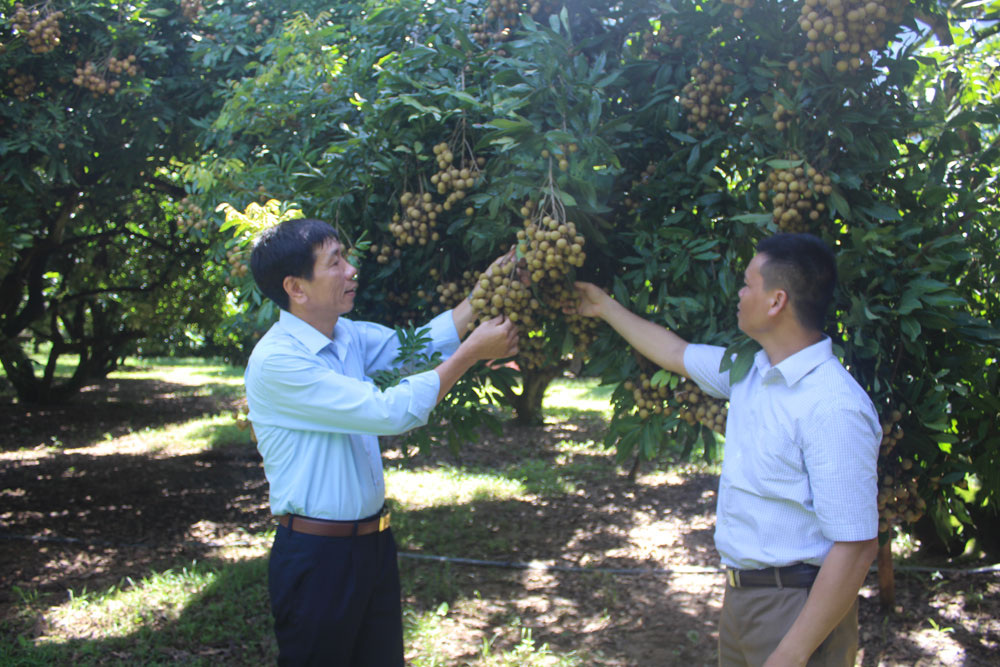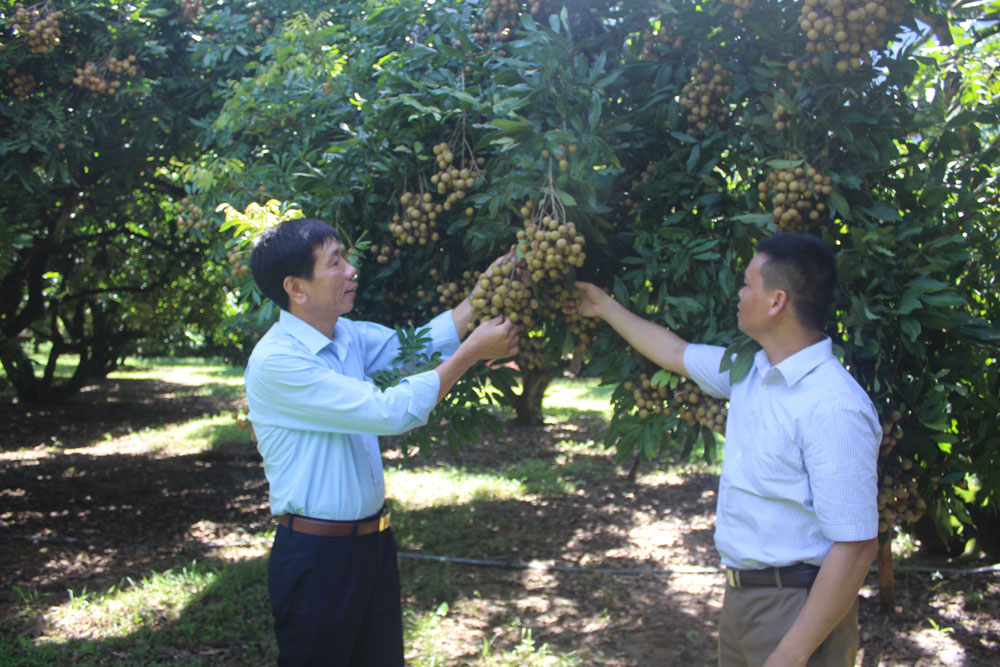
(HBO) – Hoa Binh province is home to a large number of unique farm produce, handicrafts, and tourism services imbued with cultural identities of each locality. Despite their good quality and design, products are still mainly sold in the province, and only few of them have stretched their reach to other markets in Vietnam and the world. Facing that fact, Hoa Binh has carried out the "One Commune, One Product” (OCOP) programme with a view to seeking new production and business directions so as to improve product value, as well as people’s living standards.
 The Son Thuy longan of Kim Boi district, a three-star
OCOP produce of the province, was exported to China in 2020.
The Son Thuy longan of Kim Boi district, a three-star
OCOP produce of the province, was exported to China in 2020.
The OCOP programme is described as "a breath of
fresh air” that has spread province-wide, encouraging changes to both mindset
and action.
On September 20, 2018, the provincial People’s
Committee issued Plan No 125/KH-UBND on the implementation of the OCOP
programme for 2018 – 2020, requesting concerted solutions be taken and social
resources be mobilised so that the programme is carried out on schedule and in
an effective manner, thus helping with the building of new-style rural areas
and improvement of people’s income and living standards.
The province looked to standardise at least 25
percent of existing products (about 50 products); develop at least 10 – 15
culture and tourism villages; diversify and enhance the intensive processing of
products under value chains; promote connectivity among production households,
cooperatives, and businesses; and build a database system about
provincial-level OCOP products.
Under the programme, local agriculture has made
important strides as seen in the commercial farming of key plants and
livestock, along with the formation of concentrated and large-scale production
zones like the citrus fruit farming areas in Cao Phong, Kim Boi, Lac Thuy, Tan
Lac, Luong Son, and Yen Thuy districts. Hoa Binh has also formed 11 craft
villages while community-based tourism have been growing in many places like
Ban Lac (Mai Chau district) and Da Bia (Da Bac district), which have become
magnets to domestic and foreign visitors.
The implementation of the OCOP programme is
viewed as an effective and strategic solution for each locality to tap into
their strengths in agriculture, non-agriculture, and services.
Nguyen Huy Nhuan, Director of the Hoa Binh
Department of Agriculture and Rural Development, said as directed by the
provincial People’s Committee, the agriculture sector has worked with other
departments, sectors, and localities to select key products of local
agriculture, craft industry, and tourism services for the OCOP programme, in
which participants have been assisted with production machinery, package and
label design, origin labeling, intellectual property certificates, and product
marketing.
OCOP is considered a fair playground requiring
every participant to exert efforts to create high-quality products that have
good design and meet standards.
Director of the Tan Lac Son Cooperative Do Trong
Hiep and other members of this cooperative is an example.
Hiep said in 2019, they registered their "giao
co lam” (Gynostemma pentaphyllum) tea for the OCOP programme but failed since
they lacked product testing results. With the resolve and efforts to
standardise the tea, it was recognised as a three-star OCOP product at the
provincial level last year.
Apart from efforts to help products meet OCOP
standards, local producers have also worked to improve their products’ ratings.
For instance, from a provincial-level three-star OCOP product recognised in
2019, the high-end orange gift set of the 3T Cao Phong Agricultural Product
Cooperative secured a four-star rating in 2020.
Thanks to strong moves by authorities and
sectors, along with unceasing efforts of local producers, the OCOP programme
has opened up new opportunities and momentum for rural areas to develop.
The number of provincial-level OCOP products in
Hoa Binh increased from 27, comprising nine four-star and 18 three-star
products, in 2019 to 44, with nine four-star and 35 three-star ones, in 2020./.
According to data from the Hoa Binh Provincial Party Committee, the industrial production index for the first six months of 2025 is estimated to have increased by 20% compared to the same period last year. This marks the highest year-on-year growth rate for this period since 2020.
In the first six months of 2025, Hoa Binh province’s export turnover was estimated at 1.145 billion USD, marking an 18.11% increase compared to the same period in 2024. Import turnover was estimated at $ 804 million, a 17.15% increase, which helped the province maintain a positive trade balance.
The lives of the ethnic minority farmers in Tan Lac district have gradually improved thanks to the new directions in agricultural production. This is a testament to the collective strength fostered through the professional associations and groups implemented by various levels of the district’s Farmers’ Union.
With the motto the "product quality comes first,” after nearly one year of establishment and operation, Muong village’s Clean Food Agricultural and Commercial Cooperative, located in Cau Hamlet, Hung Son Commune (Kim Boi district), has launched reputable, high-quality agricultural products to the market that are well-received by consumers. The products such as Muong village’s pork sausage, salt-cured chicken, and salt-cured pork hocks have gradually carved out a place in the market and they are on the path to obtaining the OCOP certification.
In the past, the phrase "bumper harvest, rock-bottom prices" was a familiar refrain for Vietnamese farmers engaged in fragmented, small-scale agriculture. But today, a new spirit is emerging across rural areas of Hoa Binh province - one of collaboration, organisation, and collective economic models that provide a stable foundation for production.
Maintaining growing area codes and packing facility codes in accordance with regulations is a mandatory requirement for agricultural products to be eligible for export. Recently, the Department of Agriculture and Environment of Hoa Binh province has intensified technical supervision of designated farming areas and packing facilities to safeguard the "green passport" that enables its products to access international markets.



 The Son Thuy longan of Kim Boi district, a three-star
OCOP produce of the province, was exported to China in 2020.
The Son Thuy longan of Kim Boi district, a three-star
OCOP produce of the province, was exported to China in 2020.